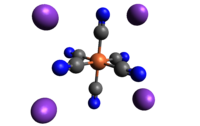亚铁氰化钾
| 亚铁氰化钾 | |
|---|---|

| |

| |

| |
| IUPAC名 Potassium hexacyanoferrate(II) 六氰合铁(II)酸钾 | |
| 别名 | 亚铁氰化钾 黄血盐 |
| 识别 | |
| CAS号 | 13943-58-3(无水) 14459-95-1(三水) |
| PubChem | 161067 |
| ChemSpider | 20162028 |
| SMILES |
|
| EINECS | 237-722-2 |
| 性质 | |
| 化学式 | K4[Fe(CN)6] |
| 摩尔质量 | 三水:422.388 g·mol⁻¹ |
| 外观 | 淡黄色结晶颗粒 |
| 密度 | 1.85 g/cm3(三水) |
| 熔点 | 70 °C(343 K) |
| 沸点 | 400 °C(673 K) |
| 溶解性(水) | 28.9 g/100 mL(三水,20°C) |
| 溶解性 | 不溶于乙醇、乙醚 |
| 磁化率 | −130.0·10−6 cm3/mol |
| 结构 | |
| 晶体结构 | 单斜 |
| 危险性 | |
GHS危险性符号
| |
| GHS提示词 | Warning |
| H-术语 | H411 |
| P-术语 | ? |
| NFPA 704 | |
| 闪点 | 不燃 |
| 致死量或浓度: | |
LD50(中位剂量)
|
6400 mg/kg(大鼠口服)[1] |
| 相关物质 | |
| 其他阴离子 | 铁氰化钾 |
| 其他阳离子 | 亚铁氰化钠 普鲁士蓝 |
| 附加数据页 | |
| 结构和属性 | 折射率、介電係數等 |
| 热力学数据 | 相變数据、固、液、气性质 |
| 光谱数据 | UV-Vis、IR、NMR、MS等 |
| 若非注明,所有数据均出自标准状态(25 ℃,100 kPa)下。 | |
亚铁氰化钾,俗称黄血盐,化学式为K4[Fe(CN)6]·3H2O,它是配位化合物[Fe(CN)6]4−的钾盐。室温下为柠檬黄色单斜晶体。
合成
[编辑]1752年,法国化学家皮埃尔·约瑟夫·麦克尔首先报道了亚铁氰化钾的制备,他通过使普鲁士蓝与氢氧化钾反应来实现。[2][3]
现代生产
[编辑]亚铁氰化钾在工业上由氰化氢、氯化亚铁和氢氧化钙生产,它们组合生成亚铁氰化钙Ca2[Fe(CN)6]·11H2O。然后用钾盐处理该溶液以沉淀混合的钾-钙盐CaK2[Fe(CN)6],最后再用碳酸钾处理得到钾盐。[4]
历史生产
[编辑]从历史上看,该化合物是由含有氮、铁和碳酸钾的有机化合物制成的。[5]常见的氮源和碳源是焙烧后的角、皮革废料、内脏或干血。它也可以从煤气厂的废氧化物(含有氰化氢)中获得。
化学性质
[编辑]用硝酸处理亚铁氰化钾可以得到H2[Fe(NO)(CN)5]。用碳酸钠中和后,可以选择性地结晶出硝普钠的红色晶体。[6]
- 2 K4[Fe(CN)6] + Cl2 → 2 K3[Fe(CN)6] + 2 KCl
该反应可用于从溶液中去除亚铁氰化钾。[來源請求]
亚铁氰化钾和铁盐反应生成普鲁士蓝Fe3+
4[Fe2+
CN)
6]
3,这种物质是蓝图颜色的来源。
应用
[编辑]亚铁氰化钾在工业中有许多应用。它和其钠盐被广泛用作路盐和食盐的抗结剂。亚铁氰化钾和亚铁氰化钠也被用于锡的提纯和从钼矿石中分离铜。亚铁氰化钾可用于生产葡萄酒和柠檬酸。[4]
截至2017年,在欧盟,亚铁氰酸盐(E535–538)仅被授权在两个食品类别中作为盐替代品。肾是亚铁氰酸盐毒性的器官。[7]
亚铁氰化钾可用于动物饲料。[8]
在实验室中,亚铁氰化钾用于确定高锰酸钾的浓度,这种化合物通常用于氧化还原滴定。 亞铁氰化钾与铁氰化钾和磷酸盐缓冲溶液混合使用,为β-半乳糖苷酶提供缓冲液,该酶用于裂解X-gal,使与β-gal共轭的抗体(或其他分子)与目标结合的地方呈现出明亮的蓝色。 在与铁离子反应时,它会产生普鲁士蓝色。因此,它被用作实验室中铁的鉴定试剂。
亚铁氰化钾可用作植物的肥料。[來源請求]
公元1900年前,在卡斯纳法发明之前,亚铁氰化钾是碱金属氰化物的最重要来源。[4]在这个历史过程中,氰化钾是通过分解亚铁氰化钾产生的[5]:
- K4[Fe(CN)6] → 4 KCN + FeC2 + N2
其中,FeC2是计量比组成的混合物,包括α-Fe、C和Fe3C等。[9]若在空气中热分解,则会有KFeO2等氧化产物。[10]
结构
[编辑]与其他金属氰化物一样,亚铁氰化钾不管是水合物还是无水盐,都具有复杂的聚合结构。该聚合物由八面体 [Fe(CN)6]4−中心与CN配体结合的K+离子交联。[11]当固体溶解在水中时,K-CN键会断裂。[來源請求]
毒性
[编辑]亚铁氰化钾无毒,在体内不会分解为氰化物。对大鼠的毒性低,致死量 (LD50) 为6400mg/kg。[12]
参见
[编辑]参考資料
[编辑]- ^ http://chem.sis.nlm.nih.gov/chemidplus/rn/13943-58-3
- ^ Macquer. Éxamen chymique de bleu de Prusse [Chemical examination of Prussian blue]. Histoire de l'Académie royale des sciences … , § Mémoires de l'Académie royale des Sciences. 1752: 60–77 [2022-01-29]. (原始内容存档于2022-01-29) (法语). From pp. 63-64: "Après avoir essayé ainsi inutilement de décomposer le bleu de Prusse par les acides, … n'avoit plus qu'une couleur jaune un peu rousse." (After having tried so vainly to decompose Prussian blue by acids, I made recourse to alkalies. I put a half ounce of this [Prussian] blue in a flask, and I poured on it ten ounces of a solution of nitre fixed by tartar [i.e., potassium nitrate (nitre) which is mixed with crude cream of tartar and then ignited, producing potassium carbonate]. As soon as these two substances had been mixed together, I saw with astonishment that, without the aid of heat, the blue color had entirely disappeared; the powder [i.e., precipitate] at the bottom of the flask had only a rather gray color: having put this vessel on a sand bath in order to heat the solution until it simmered, this gray color also disappeared entirely, and all that was contained in the flask, both the powder [i.e., precipitate] and the solution, had only a yellow color [that was] a little red.)
- ^ Munroe, Charles E.; Chatard, Thomas M. Manufactures: Chemicals and Allied Products. Twelfth Census of the United States: Bulletins. 1902, (210): 1–306 [2022-01-29]. (原始内容存档于2022-01-29).; see p. 31.
- ^ 4.0 4.1 4.2 Gail, E.; Gos, S.; Kulzer, R.; Lorösch, J.; Rubo, A.; Sauer, M.; Kellens, R.; Reddy, J.; Steier, N.; Hasenpusch, W. Cyano Compounds, Inorganic. Ullmann's Encyclopedia of Industrial Chemistry. Weinheim: Wiley-VCH. October 2011. ISBN 978-3527306732. doi:10.1002/14356007.a08_159.pub3.
- ^ 5.0 5.1 Von Wagner, Rudolf. Manual of chemical technology. New York: D. Appleton & Co. 1897: 474 & 477 [2022-03-13]. (原始内容存档于2019-03-09).
- ^ Seel, F. Sodium nitrosyl cyanoferrate. Brauer, G. (编). Handbook of Preparative Inorganic Chemistry 2 2nd. New York: Academic Press: 1768. 1965 [2022-01-29]. LCCN 63-14307. (原始内容存档于2010-03-07).
- ^ Peter Aggett, Fernando Aguilar, Riccardo Crebelli, Birgit Dusemund, Metka Filipič, Maria Jose Frutos, Pierre Galtier, David Gott, Ursula Gundert‐Remy, Gunter Georg Kuhnle, Claude Lambré, Jean‐Charles Leblanc, Inger Therese Lillegaard, Peter Moldeus, Alicja Mortensen, Agneta Oskarsson, Ivan Stankovic, Ine Waalkens‐Berendsen, Rudolf Antonius Woutersen, Matthew Wright and Maged Younes. Re‐evaluation of sodium ferrocyanide (E 535), potassium ferrocyanide (E 536) and calcium ferrocyanide (E 538) as food additives. EFSA Journal. 2018, 16 (7): 5374 [2022-01-29]. PMC 7009536
 . PMID 32626000. doi:10.2903/j.efsa.2018.5374
. PMID 32626000. doi:10.2903/j.efsa.2018.5374  . (原始内容存档于2022-01-29).
. (原始内容存档于2022-01-29).
- ^ EuSalt Expert Meeting on E 535 and E 536 as Feed Additives. EUSalt. [2022-01-29]. (原始内容存档于2019-05-12).
- ^ Ormont, B.; Petrov, B. A. Thermal decomposition of simple and complex cyanides with formation of alkali metals, especially potassium. Monatshefte fuer Chemie. 1936, 68: 171-187. ISSN 0026-9247.
- ^ J. I. Kunrath, C. S. Müller, E. Frank. Thermal decomposition of potassium hexacyanoferrate(II) trihydrate. Journal of Thermal Analysis. 1978-12, 14 (3): 253–264 [2023-02-12]. ISSN 0022-5215. doi:10.1007/BF01915163 (英语).
- ^ Willans, M.J.; Wasylishen, R.E.; McDonald, R. "Polymorphism of potassium ferrocyanide trihydrate as studied by solid-state multinuclear NMR spectroscopy and X-ray diffraction" Inorganic Chemistry 2009, volume 48, p4342-4353
- ^ POTASSIUM FERROCYANIDE MSDS Number: P5763 - Effective Date: 12/08/96. J. T. Baker Inc. [2012-04-08]. (原始内容存档于2015-11-21).
外部链接
[编辑]- Cyanide (inorganic) compounds fact sheet. National Pollutant Inventory Australia. [2022-01-29]. (原始内容存档于2013-04-09).

